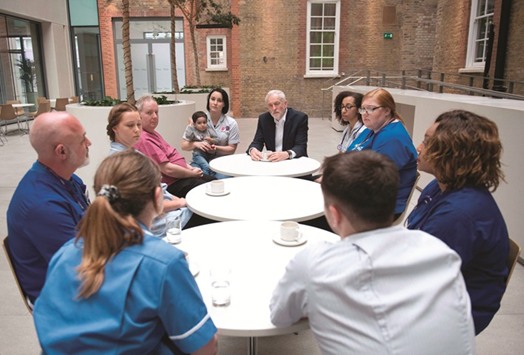Prime Minister Theresa May and opposition leader Jeremy Corbyn clashed yesterday over Brexit, the economy and security in their final parliamentary exchange before June’s general election.
In a raucous session of Prime Minister’s Questions in the House of Commons, the two leaders eyeballed each other while outlining competing visions as MPs behind them cheered and jeered.
May repeated her campaign mantra that only she can provide “strong and stable leadership” to guide Britain through its potentially tortuous exit from the European Union, and said her rival was “not fit to run this country”.
But Labour leader Corbyn went on the offensive over the government’s record on austerity and public services, saying May’s Conservatives “only look after the richest”.
May called the snap vote for June 8 to seek a mandate for Brexit and is expecting to win an increased Commons majority for her party.
The prime minister, however, has ruled out a television debate during the campaign, making yesterday the last time she will go head-to-head against Corbyn before voters make their choice.
“Every vote for him is a vote for a chaotic Brexit. Every vote for me is a vote to strengthen our hand in negotiating the best deal for Britain,” she said.
“Even his supporters know he’s not fit to run this country,” May said, accusing Corbyn of uncosted spending plans and saying he was weak on defence.
Corbyn has pitched himself as the anti-establishment candidate and attacked the government’s record on the funding of schools and hospitals, as well as citing housing shortages and wage stagnation.
He said many Britons were “held back” by the government and “many people feel the system is rigged against them”. “Strong leadership is about standing up for the many, not the few.
But when it comes to the prime minister and the Conservatives they only look after the richest, not the rest,” he said.
The Conservatives have almost twice as much voter support as the opposition Labour Party ahead of a June 8 election, a lead equal to that commanded by Margaret Thatcher before her 1983 landslide victory, Ipsos MORI said.
Since the prime minister surprised rivals and financial markets by calling a snap election, opinion polls have shown May has far greater support than Labour leader Jeremy Corbyn and that she is likely to win a big majority in the 650-seat lower house of parliament.
An Ipsos MORI telephone poll of 1,004 adults conducted on April 21-25 put the Conservative lead at 23 percentage points, while a Panelbase online poll of 1,026 people on April 20-24 put their lead on 22 percentage points.
“The Conservatives are starting the campaign matching the biggest lead we have ever recorded for them during an election campaign — which was back in 1983 ahead of Thatcher’s victory,” Gideon Skinner, head of political research at Ipsos MORI, said.
Thatcher, riding a wave of popularity after the Falklands War against Argentina, won a 144-seat majority in that election against Labour’s Michael Foot, whose left-wing socialist manifesto was branded by a party colleague as “the longest suicide note in history”.

Labour leader Jeremy Corbyn attends a round table discussion with nurses, other medical staff and students during a general election campaign event in London yesterday.
